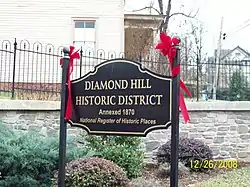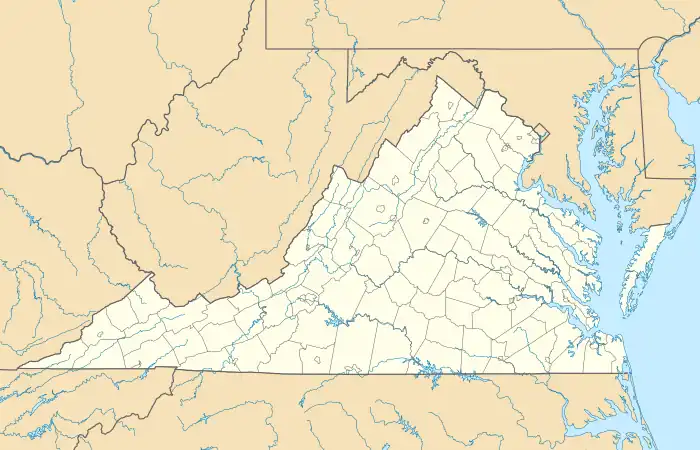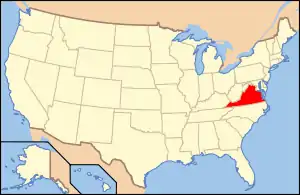Diamond Hill Historic District | |
 Diamond Hill Historic District Sign, December 2008 | |
  | |
| Location | Roughly bounded by Dunbar Dr., Main, Jackson and Arch Sts., Grace St. Lynchburg, Virginia |
|---|---|
| Coordinates | 37°24′31″N 79°8′23″W / 37.40861°N 79.13972°W |
| Area | 45 acres (18 ha) |
| Built | 1817 |
| Architectural style | Colonial Revival, Late Victorian |
| NRHP reference No. | 79003283; 83003290[1] |
| VLR No. | 118-0060 |
| Significant dates | |
| Added to NRHP | October 1, 1979 |
| Boundary increase | April 14, 1983 |
| Designated VLR | May 15, 1979, April 19, 1983[2] |
The Diamond Hill Historic District is a national historic district located in Lynchburg, Virginia. The district is irregularly shaped and approximately 14 blocks in area. It is wedged between the Lynchburg Expressway (Rt. 29) to the south and the city's central commercial core to the north. Most houses on Diamond Hill were erected during the late 19th and early 20th centuries and range from speculative houses to upper-middle-class residences. The more formidable residences line Washington and Clay streets and include a high number of Georgian Revival and Colonial Revival houses. Located in the district is the separately listed Diamond Hill Baptist Church.[3]
It was listed on the National Register of Historic Places in 1979 and expanded in 1983.[1]
Gallery
 Diamond Hill Historic District house, Lynchburg VA, December 2008
Diamond Hill Historic District house, Lynchburg VA, December 2008 Diamond Hill Historic District house, Lynchburg VA, December 2008
Diamond Hill Historic District house, Lynchburg VA, December 2008 Diamond Hill Historic District house, Lynchburg VA, December 2008
Diamond Hill Historic District house, Lynchburg VA, December 2008
References
- 1 2 "National Register Information System". National Register of Historic Places. National Park Service. April 15, 2008.
- ↑ "Virginia Landmarks Register". Virginia Department of Historic Resources. Archived from the original on September 21, 2013. Retrieved March 19, 2013.
- ↑ Alison Blanton (June 2001). "National Register of Historic Places Inventory/Nomination: Diamond Hill Historic District" (PDF). Virginia Department of Historic Resources. and Accompanying photo and Accompanying map
External links

